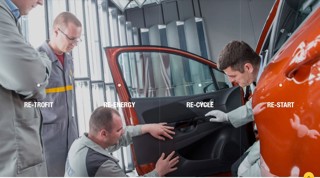UK motor retail is racing headlong into a future of AI-powered customer service - and early adopters are demonstrably benefitting. Chatbots are coming of age as virtual dealership team members, helping customers get what they need faster and delivering properly qualified leads to the dealer. But lurking in the background, as this impressive technology becomes more focused and powerful, is an elephant in the room, writes Ross Olsen, co-founder of AutoConverse.
Automotive Management's recent piece ‘AI transparency in government raises questions for business chatbots reflected my own thoughts. As a developer of this technology we agree that the current lack of independent regulatory focus on standards and transparency poses potential risks for everyone; dealers, their customers and even chatbot service providers like ourselves.
In short, AutoConverse agrees that the time has come for sensible regulation so that potential problems can be averted and this exciting market can grow, fuelled by the confidence and trust of its users.
Time for sensible regulation
The fact is that dealerships across the country are embracing customer-facing AI assistants, often without truly understanding how these systems work, how they’re trained, or where the data ends up. This is not just a theoretical concern. It’s a real, growing risk.
Although AutoConverse is flourishing under the current hands-off approach to regulation, we see how the world is changing - and with it, new questions arising.
Recent international events show us that conditions can alter fast and dramatically in ways that might directly influence this market. For example, the rules around data sovereignty - where a user’s data is stored and how it’s shared - are potentially in flux as global trade relationships fracture. If you think customers don’t care about where their data goes, just wait until the next international data-sharing dispute makes headlines.
Right now, there’s little more than GDPR standing between millions of customer interactions and a potential trust crisis. And GDPR, for all its importance, tends to react after the damage is done.
Proactive, not reactive
I don’t want to see heavy-handed regulation as a knee-jerk reaction to problems arising – no business does. We put a lot of thought into our own policies because trust is everything in UK automotive and we understand what matters to British dealers and their customers. But the fact is that this is a potentially lucrative market for those who might take short-cuts and the market will often initially reward the fastest players, not the most responsible.
Transparency around who the customer is talking to and what happens to their data should be the bare minimum responsibility for a business in our field but, at present, these are voluntary considerations - not enforced norms.
We see a future where not every provider of this powerful technology is as conscientious as they might be and then, if problems arise, the entire industry could lose the trust that’s essential to making the most of chatbot technology.
It isn’t just smaller developers like us who welcome sensible regulation as a step toward deepening trust of AI technology. Giants like OpenAI, Meta, DeepMind, and Microsoft have all called for external regulation of virtual assistants and AI chat interfaces.
When Silicon Valley asks for guardrails it’s for the same reason as AutoConverse. Tech regulation is sometimes necessary to maintain a level playing field for responsible operators and to protect users from the misuse or misplacing of their personal data.
Why trust matters more than ever
If trust in AI wobbles at the national level, why would car buyers feel confident handing their details to a dealership chatbot? Although all of our customer data remains on our shores, problems with offshoring of British customer details could reduce confidence in chatbots across the board. This would affect us too - and hurt dealers across the country, who are benefitting so much from this new way of deepening customer relationships.
When a powerful new technology like ours is embedding itself in one of Britain’s most trust-sensitive markets, with barely any oversight, it’s only a matter of time before less cool-headed media than AM begins to sound alarms. We have seen this happen in other rapidly advancing new ways of doing things, like social media and the sharing economy, like Airbnb or Uber.
The answer is not to slow innovation. It’s to introduce sensible, forward-looking regulation - now, while the industry is still taking shape. Before the virtual showroom becomes the wild west.
Ross Olsen is co-founder of AutoConverse





















Login to comment
Comments
No comments have been made yet.